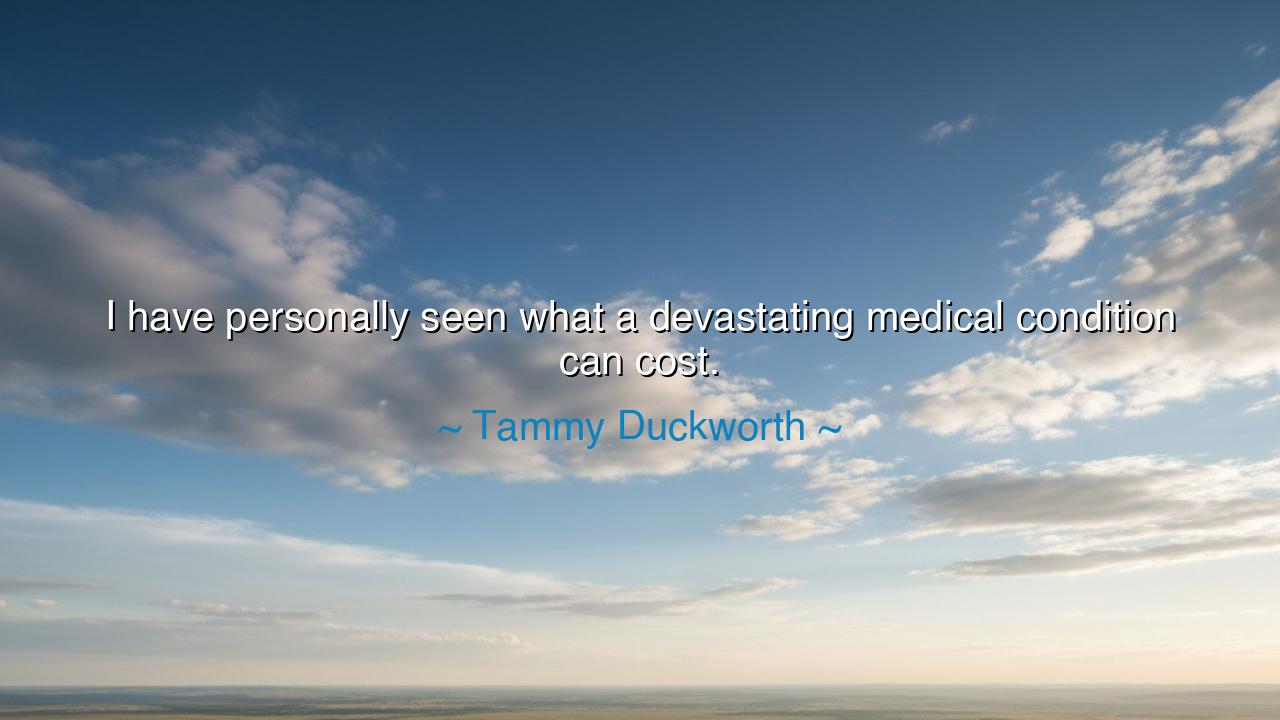
I have personally seen what a devastating medical condition can






Hear the words of Tammy Duckworth, soldier, survivor, and servant of the people: “I have personally seen what a devastating medical condition can cost.” In these few but thunderous words, she bears witness to the true price of illness and injury. It is not only measured in pain, in broken bodies, or in long recoveries, but also in the crushing weight of financial burden, the sorrow of families, and the trials of the human spirit. She speaks not from hearsay, but from lived experience, carrying in her body and in her heart the scars of war and the cost of survival.
The origin of this truth lies in Duckworth’s own life. As a combat pilot in Iraq, she suffered grievous wounds when her helicopter was struck, costing her both legs and nearly her life. She endured the long path of surgeries, rehabilitation, and adaptation. Yet even with the aid of veterans’ healthcare, she came to see clearly the hidden side of medical conditions: the immense financial, emotional, and societal costs that such suffering inflicts. Her testimony is not abstract—it is the cry of one who has walked through fire and seen how quickly devastation can consume not only a body but an entire household.
The ancients knew that illness was not merely a private affliction but a communal trial. In Greek tragedies, the plague upon Thebes was not simply sickness but a symbol of a city brought low. In every age, when one person suffers a devastating condition, their family, their community, and their nation feel the cost. The farmer who cannot till his land, the mother who cannot rise from her bed, the warrior who cannot return to the field—all these losses ripple outward, touching lives far beyond the afflicted. Duckworth’s words remind us that no suffering is borne alone.
Consider the story of Franklin Delano Roosevelt, who was struck with polio in the prime of his life. The disease robbed him of the use of his legs, yet it also revealed the crushing weight of medical conditions in an era with little support for the disabled. He bore the stigma, the limitations, and the endless cost of adaptation. Yet in enduring this, he gained the compassion and fortitude that later made him a leader through depression and war. His story, like Duckworth’s, shows that the cost of illness is immense, but from such trials can emerge voices of strength.
The meaning of Duckworth’s words, then, is both lament and instruction. She warns us that the cost of a devastating medical condition is not borne only by the afflicted, but by all of us who make up society. The cost is financial, when families are driven into debt; it is emotional, when despair creeps into households; it is civic, when a nation fails to provide care and loses the gifts of its citizens. Yet her testimony is also a reminder that compassion and policy must rise to meet this truth—that we cannot ignore the suffering of others without diminishing our own humanity.
The lesson for us is clear: we must never dismiss illness or injury as the misfortune of another. It is the concern of all. Support systems, healthcare policies, and communities must be built with the recognition that every person is vulnerable, that today’s strength can become tomorrow’s frailty. To look away is to invite injustice; to look closely, as Duckworth urges us to do, is to awaken the courage to change what is broken.
Practical action flows from this teaching: advocate for affordable and accessible medical care, for no one should be driven to ruin because their body failed them. Offer compassion and tangible support to families burdened by illness, for even small acts of help lighten a crushing load. And in your own life, prepare not only for success but for hardship, knowing that strength lies not in pretending invulnerability but in building resilience and community.
Thus, Duckworth’s words resound like a beacon: a reminder that the cost of medical conditions is vast, but it is not inevitable that people should face it alone. From her suffering, she draws a lesson for us all: that compassion, justice, and foresight are the shields that protect us from despair. Let us carry her testimony into our lives, so that no one’s tragedy becomes a sentence of isolation, and so that from the ashes of devastation, we may build a society that truly cares for its own.






AAdministratorAdministrator
Welcome, honored guests. Please leave a comment, we will respond soon